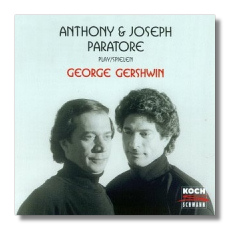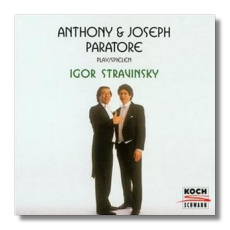
The Internet's Premier Classical Music Source
Related Links
- Gershwin Reviews
- Latest Reviews
- More Reviews
-
By Composer
-
Collections
DVD & Blu-ray
Books
Concert Reviews
Articles/Interviews
Software
Audio
Search Amazon
Recommended Links
Site News
 CD Review
CD Review
Gershwin / Stravinsky

Works for 2 Pianos
George Gershwin
- Fantasy on Themes from "Porgy and Bess" (arr. Grainger)
- Concerto in F (arrangment for two pianos)
- Rhapsody in Blue (arrangement for two pianos)
Anthony and Joseph Paratore, pianos
Koch-Schwann 3-1439-2 H1 DDD 64:57


Igor Stravinsky
- Concerto for Two Pianos
- Le Sacre du printemps (arrangement for two pianos)
Anthony and Joseph Paratore, pianos
Koch-Schwann 3-1438-2 DDD 56:15
Sometimes performers need to leave their home countries in order to get the recognition that they deserve. Many Americans love other sibling keyboard pairs such as the Labèques and the Pekinels, but how many of them have heard the Paratore brothers? Since winning the Munich International Music Competition, they've done well in Germany, but their North American audience has been smaller. (I believe that they're American, but I can't find any biographical information to verify it.) In the dying days of the LP, CBS Masterworks licensed an enjoyable disc of operatic transcriptions from Koch-Schwann for distribution in the United States, but that's all I've heard from this talented pair until recently. It's good to know that they're still around and still recording music for two pianos, and that Koch International is distributing these discs domestically.
The idea of hearing The Rite of Spring stripped of its orchestral garb initially might be unappealing, but the composer's two-piano version is more than a pale clone of the orchestral version. In fact, it can be just as effective, but in a completely different way; witness the Paul Taylor Dance Company's resetting of the ballet as a murder mystery in Chinatown. Black and white can be starker than color, and skeletal forms can be more frightening than forms that are fleshed-out orchestrally. This score sounds more difficult to play when its labors are divided among two players and not a hundred, and that adds to the drama. The same holds true for Percy Grainger's Fantasy on Themes from "Porgy and Bess"; the rhythms crackle more when the ear isn't distracted by different orchestral timbres, and it's thrilling to hear two men doing the work of many.
The Paratores aren't as showy as the more popular sibling piano duos, and their experience gives them a slight advantage over some of the ad hoc pairs who have recorded The Rite of Spring (most recently, Ashkenazy and Gavrilov on London/Decca). There's more Gershwin and Stravinsky in these readings, and less hype. The Labèques offer us manic Gershwin, and Ashkenazy and Gavrilov offer percussive, dry Stravinsky. I like the Paratores's relatively clean, classical, and matter-of-fact approach to these scores, and I don't hear any reason for preferring the bigger-named alternatives. I see that Koch-Schwann has made the operatic transcription disc mentioned above available on CD, with some popular fillers (CD310115 reissued as 3-6720-2). Also, there's a disc of variations by Beethoven, Lutosławski, Mendelssohn, Schumann, and Saint-Saëns (CD310088), and I bet that it's fun too. Decent sound, somewhat sketchy program notes.
Copyright © 1996, Raymond Tuttle


















